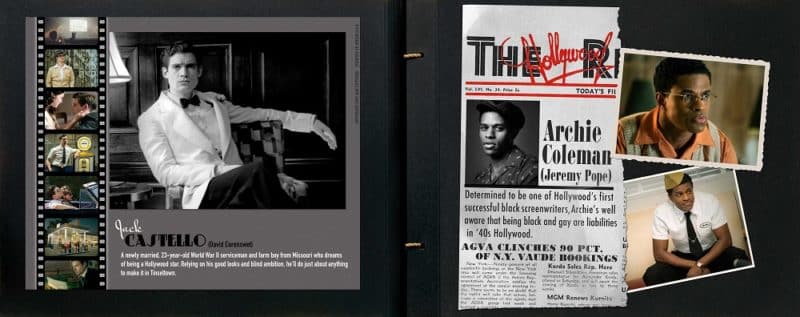Viewing habits are adapting to post-Covid-19 conditions. One is the acceptance of “limited series” formats on streaming platforms that resemble standard-length features made for the big screen.
These are not the padded-out crime stories using formulaic characters. At their best, series of four-to-eight episodes allow greater plot nuance and character development.
Recent examples are HBO’s The Plot Against America, based on Philip Roth’s novel about the plight of Jews under Nazi-sympathising United States President Charles Lindbergh, and Netflix’s dramatisation of Deborah Feldman’s autobiographical Unorthodox about her flight from New York’s Hasidic Jewish community (noted here in the April 19 issue).
The former was based on a counterfactual notion that Lindbergh, the famous aviator, defeated Franklin D. Roosevelt in the 1940 election.
Ryan Murphy and Ian Brennan’s Hollywood is a Netflix mini-series set in the late 1940s that also mixes real-life historical figures and events with fictional material.
While The Plot Against America fits the more traditional TV convention of a literary adaptation that tries to maintain as much of its source material as it can, Hollywood goes further into fantasy than Quentin Tarantino’s Once Upon a Time in Hollywood, set four decades later.
Both have counterfactual “Hollywood” endings. Hollywood ends with hopes of racial and sexual diversity several decades ahead of reality. A major (fictional) studio makes a movie called Meg that boasts an African-American female star and is based on a screenplay by a gay African-American male. Both win Oscars in the 20th Academy Awards in 1948, a reconstructed event.
Some of this is true. Hollywood features Hattie McDaniel (played by Queen Latifah), who won an Oscar for best supporting actress for Gone With the Wind in 1940. A fictional Oscar is awarded to Anna May Wong, who was passed over for the lead role in the 1937 film of Pearl Buck’s The Good Earth, despite her Chinese ethnicity (the role went to Luise Rainer, a German).
McDaniel was largely excluded from her award ceremony, and this is recalled in the 1948 reconstruction. Hollywood’s Hays Code forbade inter-racial screen intimacy until 1956, and open practice of sexual diversity was not fully accepted until decades later.
In fact, no African-American actress had ever won an Oscar for best actress until Halle Berry did for Monster’s Ball in 2002. The first screenplay award to an African-American was not until Jordan Peele in 2018 for Get Out.
But much of Hollywood is grounded in reality. The gas station that employed would-be actors was used for pickups. Eleanor Roosevelt did urge Hollywood bosses to adopt progressive views. Rock Hudson was a struggling actor until he became famous in the mid-1950s, while his manipulative agent, Henry Willson, had mafia connections.
In summary, this is Hollywood’s way of back-projecting today’s values to absolve sins of the past.
Netflix rating (Hollywood): 16+. 347 minutes (7 episodes)
CLIPS
Les Misérables
(Rialto)
Paris is known for its riots, but few filmmakers enter the suburbs dominated by migrants, known as banlieues. One of them is Montfermeil, characterised by high-rise apartment blocks and populated by Africans. Mali-born writer-director Ladj Ly is familiar with these concrete jungles, where street kids mainly play soccer. France is still celebrating its World Cup win when one snatches a lion cub from a travelling circus. A crime squad trio (Damien Bonnard, Alexis Manenti and Djebril Zonga) are sent to investigate, triggering events that include an accidental shooting, which is filmed by a drone. Anxious to control an outbreak of violence, the cops dig a bigger hole when they pursue the drone operator. The bird’s-eye camera recalls a classic of the French cinema, La Haine (Hate), made 25 years ago on the same topic of disaffected youth. But this not just about an act of police brutality and the resistance that follows. It is also about a community that, from the outside, looks hopelessly estranged, but internally is governed with benign effect by an ex-thug and kebab shop owner who is also the local Muslim leader.
Rating: Restricted to audiences over 13. 104 minutes.
Bait
(Rialto)
If you thought The Lighthouse pushed the limits of extreme cinema with its early 19th century techniques, then try Mark Jenkin’s homemade version. He filmed his story of fear and loathing in a Cornish fishing village in black-and-white on a hand-cranked 16mm Bolex. Furthermore, he hand-processed the film stock and edited it as well. The result is intended as authentic localism with a post-synchronised soundtrack that pits the heavy dialects of villagers against those of middle-class holiday-making Londoners and binge-drinking students. (The title is a play on the term “fishing bait” having an alternative meaning of shady activities, of which there are many.) Edward Rowe, in his feature debut, plays the central character – an embittered fisherman who is solely interested in getting money to buy his own boat, his brother having converted their father’s into taking trips for tourists.
Rating: TBA. 89 minutes.
Color Out of Space
(StudioCanal)
Nicolas Cage gave up an A-list acting career sometime around the turn of the century in favour of appearing in as many B-grade movies as he could. That has meant making up to four a year, most of them missing a cinema release. Occasionally, he breaks the mould of his stereotypical man-of-action who turns bad or mad. He did a cameo as a government intelligence agent in Oliver Stone’s Snowden after appearing in World Trade Centre (2006). Cage’s latest big screen role is also esoteric and based on an H.P. Lovecraft horror story published in 1927. These have a cult following – much like Cage’s movies – and this will appeal to both audiences. A meteorite crashes to earth with unforeseen consequences on all the characters and an alpaca farm to boot.
Rating: Restricted to audiences over 16. 110 minutes.

Reader Interactions